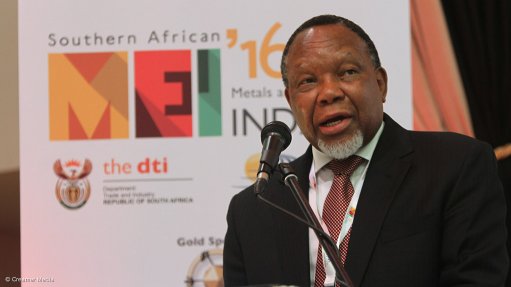
Former President Kgalema Motlanthe
Photo by: Duane Daws
The share held by South African metals and engineering producers of the domestic market fell to just 45% last year as imports continued to rise, representing a material decline from a peak of over 65% in 2002.
In fact, Steel and Engineering Industries Federation of Southern Africa chief economist Henk Langenhoven told delegates to the Metals and Engineering Indaba on Thursday that the loss in market share had seen domestic firms forfeiting significant levels of revenue and employment to importers.
The metals and engineering sector derives about half of its demand domestically, with exports, which had also fallen by 14.5% from their most recent peak in 2008, accounting for the balance.
Had the domestic industry sustained a 65% local-market position, the value of domestic production, in 2010 rand terms, would have been R100-billion higher in a total market worth R400-billion. “That would also have meant 70 000 extra job opportunities,” Langenhoven lamented.
Instead, production was currently about 30% below the 2007 peak, capacity utilisation stood at around 74% (well below the 85% aspiration) and the trade deficit in the sector had risen to R145-billion, despite the deterioration of the rand.
Profit margins had also been “decimated”, while 45 000 jobs have been shed in the sector since 2007, with 11 000 of those lost in the last year.
“We have now been in an eight year adjustment phase that seems to have plateaued at a much lower level,” Langenhoven said, noting recent improvements in the purchasing managers index as a possible indication that the sector might be at the “bottom of the trough”.
The decline in the metals and engineering subsector’s performance was also reflected in the slump in the manufacturing sector’s relative contribution to gross domestic product, which had fallen to 12.5% from nearly 20% at the turn of the century.
Langenhoven’s input followed a keynote address by former President Kgalema Motlanthe, who urged participants to collaborate more to reverse the “underperformance” of the sector.
He called for a “solution seeking” attitude, without silencing “criticism and multiplicity of view, which constitute the engine and leitmotif of progress”.
“What we would suggest is a dialectical process entailing both critical views as well as suggested means of lifting us out of the morass,” Motlanthe said.
What followed was a robust and, at times, tense exchange led by Democratic Alliance deputy shadow minister for trade and industry Dean Macpherson and Department of Trade and Industry deputy director-general Garth Strachan, who disagreed strongly on the country’s industrial policy performance.
Macpherson slammed the lack of funding for industry incentives, as well as the lack of intervention by government to prevent ArcelorMittal South Africa from raising steel prices, which was hurting downstream steel-intensive companies.
Strachan defended the interventions to move to protect domestic primary steel industry in the context of a China-induced steel glut and stressed that downstream sectors had “every legal right” to approach the International Trade Administration Commission of South Africa for similar tariff relief.
He acknowledged that such application were expensive and time consuming, but suggested that government was willing to work with industry associations to accelerate the process.
Nevertheless, he warned that the tariff instrument was limited, owing to the fact that South Africa’s pre-1994 status as a ‘developed nation’ in the eyes of the World Trade Organization implied far lower “bound rates” than was the case for developing countries. In many instances the duties that could be applied were in the single-digit range, with the bound rate for primary steel standing at 10%.
Deloitte Frontier Advisory MD Dr Martyn Davies and Manufacturing Circle executive director Philippa Rodseth summed up the overall mood, however. Davies argued that “if we are internally divided, we will never be internatially competitive”, while Rodseth called for “effective public-private partnerships” to support the country’s reindustrialisaiton efforts.